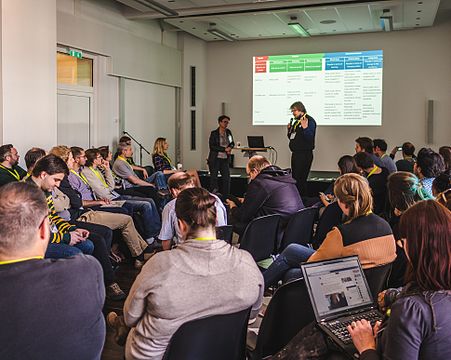Wikimedia Conference 2016/Program/12
12: Impact Working Session
[edit]How to move forward
[edit]-
Kaarel Vaidla (WMEE) using a logic model to explain how Wikimedia Estonia works
- What was this session about?
- Providing a space and a language to see the diversity of approaches and views on how we make our vision come true
- What are the next steps to be taken?
- Ther will be follow-up conversations at Wikimania. Details to be published.
- Who is the person to reach out to?
- Generally, the group around Nikki Zeuner (WMDE) is approachable for all matters regarding impact.
- Photos
![]() This session documentation was (written and) approved by the facilitator.
This session documentation was (written and) approved by the facilitator.
- Original Description
- In this session we will work together towards an understanding of the logic and diversity of a selection of (impact) approaches in the Wikimedia movement. This will be done through a facilitated process, during which participants create a map of logic models and begin a conversation about how impact is thought about and lived in our movement.
This will be an inspiring, interactive and productive session in which all participants will contribute to a large and diverse map. The session will take place in three parts:
- A plenary session of around one hour includes an introduction, explanation of the workshop methods, and short prepared examples of impact from three participants.
- Then several break-out groups will work on co-creating logic models for different approaches/programs of the Wikimedia movement.
- After a break, we will arrange all logic models in a huge map and discuss what kind of trends/priorities we see, if something is missing, etc. We will try to arrive at joint conclusions on how the Wikimedia movement achieves and thinks about impact.
| Activity | Time |
|---|---|
Full Group
|
1 hour |
Break-out groups (around 3)
|
2 hours |
Full Group
|
2 hours |
- Desired Outcome
- Understand the logic and diversity of a selection of approaches in the Wikimedia movement. Ideally, we start a movement-wide discussion on Impact for the first time.
- Session Format
- Working
- Speaker(s)
- Basically, there are no speakers, because every participant is actively involved in this working session. :)
- Summary of the session

Since our task was not to define impact, but rather to provide a space and a language to shine a light on the diversity of approaches and views on how we make our vision come true, we felt successful in having started that as well a conversation about the why and the how of what we do.
On Saturday a smaller group of us met again and discussed further what we had observed.
Our observations:
- The picture of Theories of Change we created is a random snapshot based on who was there that day and what examples they chose. Many impacts paths and subpaths are obviously missing from that picture.
- The two main paths/highways that emerged were content and awareness.
- We had asked for theories of change of existing projects, not for those in planning. However, there is great potential in terms of using logic models as a learning tool, and show iterations and changes and failures as projects are implemented.
- Many of the logic models we see were generated in the western/northern hemisphere. For the emerging communities, we still have to develop and test theories of change.
- One of the dimensions that is difficult to show on a map is scale, as well as the innovative or potential model character of activities.
Learnings/ Findings
Various paths to impact emerged through the conversation and beginning mapping. There are many dimensions that can be used to describe the paths: volunteer work, technical work, content work, work with movement partners, advocacy and work with external partners. The paths interweave and ideally support and leverage each other. Further mapping should reflect these paths. Depending on the background and maturity of participating organizations, interests and needs around impact differ. We identified two main streams: Participants interested in learning about methods and tools, and creating capacity at their own organization e.g. in terms of measurement, metrics, programmatic planning Participants interested in engaging in a meta-movement discussion around impact and related strategies, and in understanding the big messy picture.
What could be next...some ideas
- Continue this crucial conversation about how we achieve impact in the movement. Become better at articulating our great work that we are so proud of. Answer questions such as: What are the paths, and how do they map out? What strategies work and which need to be altered? Find a common language that allows to articulate our diversity. Assure that we all have access to methods and tools and are enabled to use them. How do we do that, while addressing both interest groups above? Ideas:
- Keep working on the map and outline paths and how they intersect and branch out. This might be done virtually, like a mind map, and help movement actors in articulating their impact and how it relates to that of others and how it is situated in the overall movement ToC.
- Continue the conversation across conferences, towards slowly creating a community of learning and practice. This could go along the lines of the mind map, logic models as clickable point on that map, and all the way to metrics and collecting an evidence base for promising, good and best practices. Create something we can use for learning from each other, and iterating together, beyond just posting and reading learning patterns.

